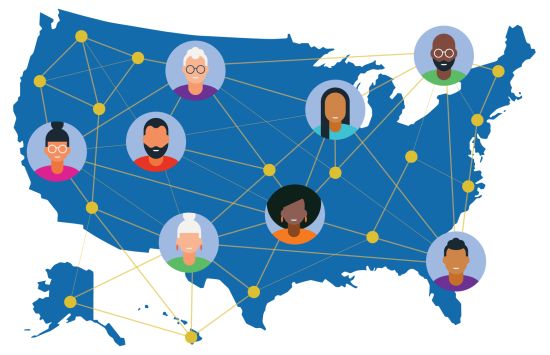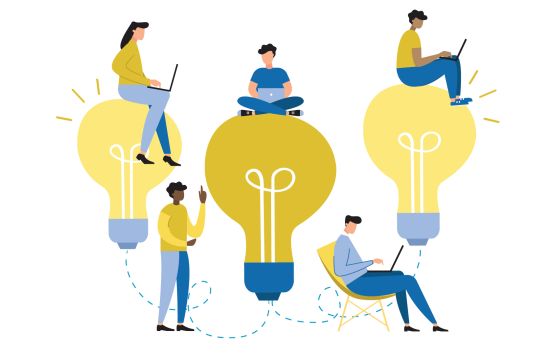Organization(s)
Overview
National-scale societal challenges cannot be solved by a single discipline. Instead, these challenges require convergence: the merging of innovative ideas, approaches, and technologies from a wide and diverse range of sectors and expertise.
Launched in 2019, the NSF Convergence Accelerator builds upon basic research and discovery to accelerate solutions toward societal impact. The program funds teams to solve societal challenges through convergence research and innovation. To enhance its impact, the Accelerator also places teams together in cohorts, synergizing their work through facilitated collaboration.
While the overarching goal of the program is to enable long-lasting societal impact, results for each solution and the way a solution transitions to societal impact will vary. Examples include:
- Integration of a solution into existing systems.
- Production of open-source tools and knowledge products.
- Expansion of a solution into new markets.
- Follow-on funding and investment.
A unique innovation program
The Convergence Accelerator's unique program structure offers researchers and innovators the opportunity to accelerate their research toward tangible solutions that make a difference. Through an intense and hands-on journey, researchers gain skills and experiences that are applied during the program and throughout one's career.
The program is focused on a convergent research approach that:
- Is use-inspired and application-oriented.
- Is fed by basic research and discovery.
- Integrates teams from industry, academia, nonprofits, government and other communities of practice.
- Offers intensive hands-on education and mentorship to participants.

Multidisciplinary approach
Funded teams are composed of diverse disciplines, expertise, and organizations. Teams merge ideas and share approaches and techniques to speed use-inspired solutions toward real-world application. Teams have no size limits and are expected to evolve as a project advances.

Societal impact
Funded projects are intentionally focused on sustainability and national-scale impact. At the end of the fixed three-year term, teams are expected to provide high-impact deliverables that address societal challenges and enhance the nation’s competitiveness and security.

Cross-cutting partnerships
Catalyzed partnerships strengthen each funded effort by providing end-user insights, resources, services, infrastructure and transition-to-practice pathways.

Innovation curriculum
The innovation curriculum provides teams the tools to move from idea to proof of concept, to prototype and then solution. Researchers gain knowledge in human-centered design, team science, communication, and storytelling and pitching.

Coopetition environment
A "coopetition" environment stimulates innovative ideas. Funded teams compete and share expertise and resources to assist solutions in advancing to the next phase.

Track alignment
Phase 2 teams collaborate on integration with other teams within their convergent research track — ensuring the track's focus is more impactful than each individually funded effort.
Engaging the Convergence Accelerator
There are several opportunities for researchers, innovators, and business and technical practitioners from academia, industry, nonprofits, government and other organizations to engage with the Convergence Accelerator. Industry, nonprofit, government, and international collaborations are welcomed, but the collaborations must follow the NSF Proposal and Award Policies and Procedures Guide (PAPPG).

Credit: National Science Foundation
Further an idea through a workshop: NSF funds workshops on promising ideas submitted during the ideation process. Workshops are held to further develop an idea, incorporating convergence research and various disciplines and expertise. NSF promotes the workshops to allow researchers and innovators to engage in workshop dialogues. If an idea that you submitted during the ideation process is chosen by NSF, the program may ask you to lead the development of a workshop on that topic.
Form a team and apply to a convergence research solicitation: Each year the program releases a solicitation funding opportunity featuring several convergent research topics selected from the program’s ideation process. Researchers and innovators are encouraged to apply. The submitted project team must represent a mix of disciplines, expertise and organizations from academia, industry, nonprofits, government, and other communities of practice and sectors.
Contribute to a currently funded solution: Cross-cutting partnerships are vital to the Convergence Accelerator and the funded teams. Partners provide expertise, represent end users, provide resources, services and infrastructure, or support a transition or educational pathway. View currently funded teams at the Convergence Accelerator’s portfolio page or reach out to a program director to learn more.
Be a reviewer: Provide your expertise to assist NSF in funding the best research ideas and solutions. If you are interested in serving as a reviewer for future proposals or site visits, please fill out the Convergence Accelerator reviewer form.



